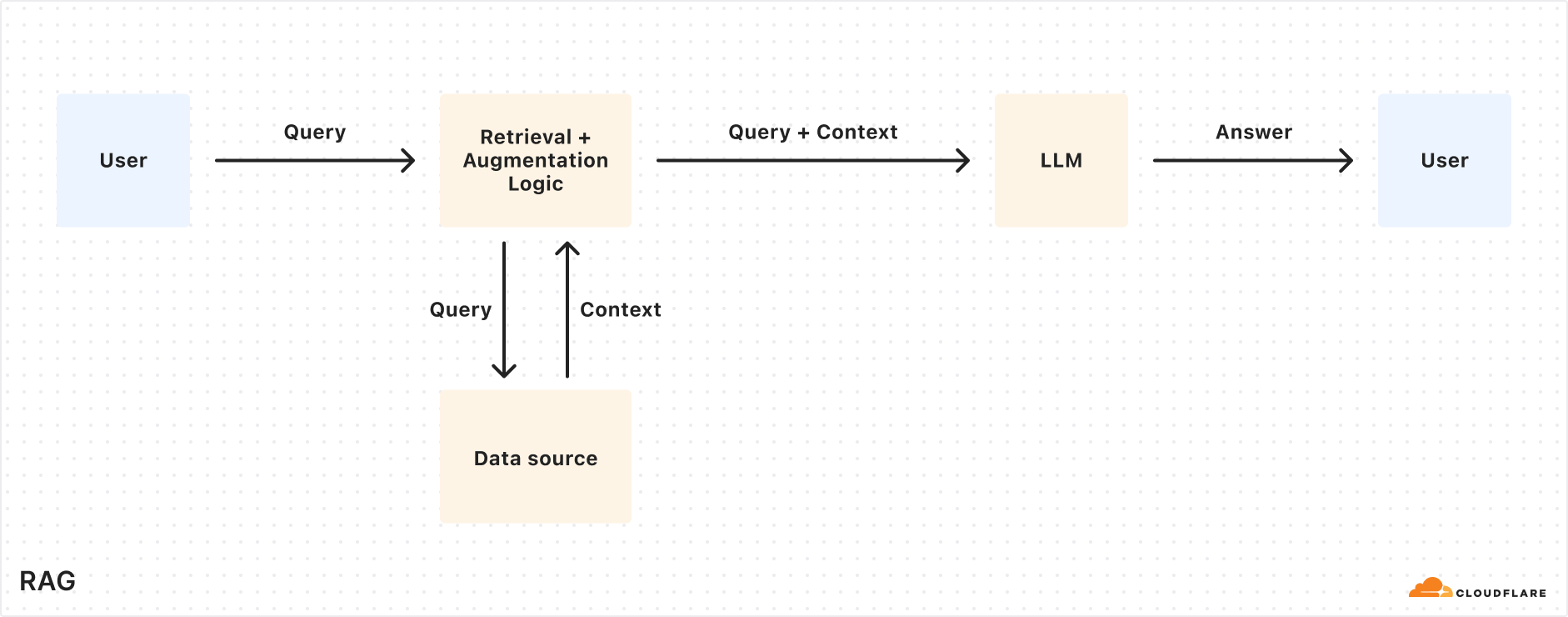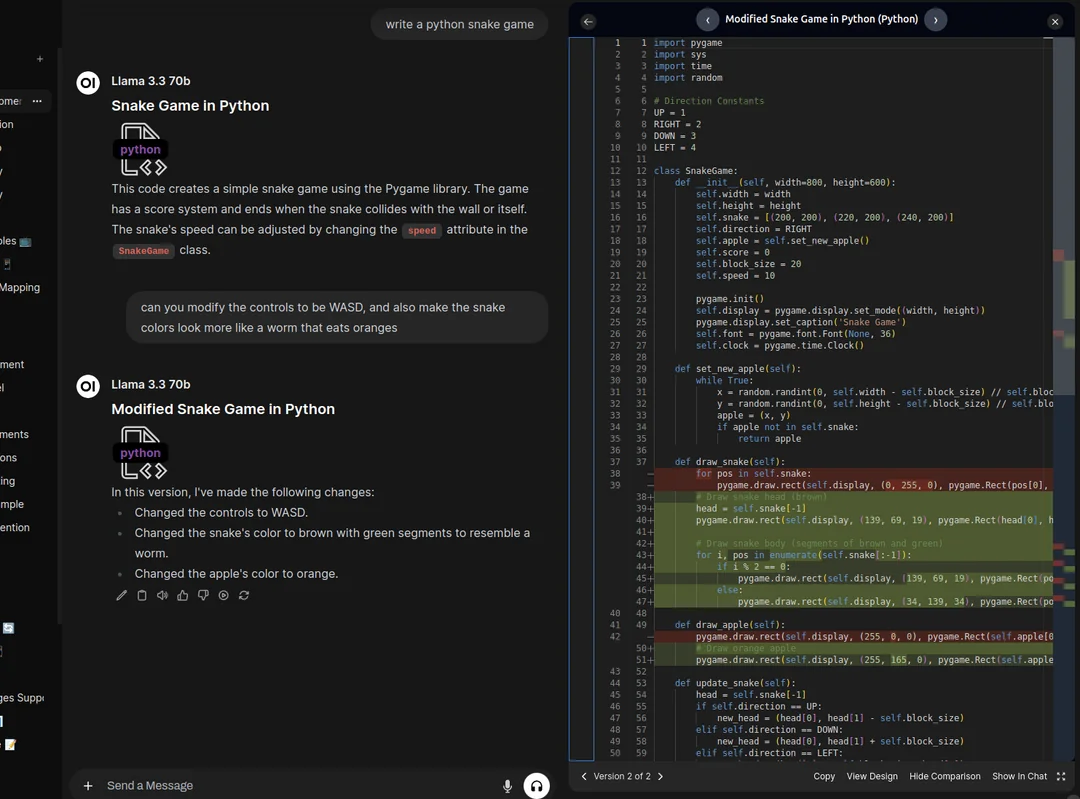Deep Lake proposes a Deep Research program built on private multimodal data.
Providing more accurate, flexible and multimodal knowledge agents for your private and public data, Activeloop's Deep Thinking technology is now fully available.
As we look ahead to 2025, Generative AI (GenAI) is poised for a pivotal year in terms of return on investment (ROI). Knowledge agents based on multimodal data are a core driver in realizing this goal.
Why we built Deep Research in the first place
Over the past year, the Activeloop team has had in-depth conversations with a wide range of organizations, particularly Fortune 500 companies. They've discovered a pervasive trend: business users show some tolerance for performance latency, but a reduction in accuracy isuncompromisingThe fact is that the accuracy of data retrieval has become an insurmountable bottom line. Indeed, the accuracy of data retrieval has become an insurmountable bottom line that is directly related to an organization's ability to truly improve revenue or efficiency with generative AI, and in doing so, prove that the huge investment in additional infrastructure and models is worthwhile.
Knowledge workers spend a great deal of time every day on repetitive and highly manual search tasks: from nurses organizing patient health data for insurance claim review, to paralegals conducting exhaustive patent searches for patent applications, to researchers evaluating newly published papers in PubMed to test compound hypotheses.
Conservative estimates show that manual search behavior within an organization results in approximately 21.3% to 25% of wasted productivity. This equates to a loss of approximately $20,000 per employee per year. For a medium-sized organization with 1,000 employees, inefficient searches can result in more than $20,000 per employee per year. $20 million The financial loss. Imagine that every time your team members spend time searching for those "missing" files, you're paying them to play a game of "hide and seek" with your organization's data, and no one is benefiting from it.
Today, Activeloop is proud to introduce an innovative solution designed to solve these challenges once and for all - the AI Knowledge Agent, which generates highly accurate, deeply analyzed answers based on multimodal data from inside and outside the organization.
Comparison of OpenAI Deep Research
Deep Lake together with OpenAI's Deep ResearchOpenAI's Deep Research focuses on building an AI-powered assistant that can autonomously search for information on the Internet, while Deep Lake focuses on providing an AI-powered assistant that can autonomously search for information on the Internet. Deep Lake, on the other hand, is positioned to provide Enterprise-class, multimodal AI retrieval systemThe ability to work with Public and private data Achieve seamless integration. In terms of the types of data that the user can ask questions about, and the retrieval results of the accuracy go so far as to dexterity Deep Lake has demonstrated match or even surpass The strength of OpenAI Deep Research.
1. Connecting your private and public data
A key difference between Deep Lake and OpenAI Deep Research is that theDeep Lake isn't limited to public data.. It was originally designed to Serving Enterprise Users, especially those who need to be in Proprietary, sensitive and high-value data sets organizations that perform AI-driven searches on it. In its study, Activeloop found that approximately 63% of organizations face challenges in unifying their data and connecting it to AI systems. Deep Lake can be instantly deployed in an organization's Amazon S3 or Azure cloud environment (and is already available in their respective app marketplaces), enabling users to immediately ask questions and analyze based on this data.
The deployment process is extremely easy, as shown in the figure below:
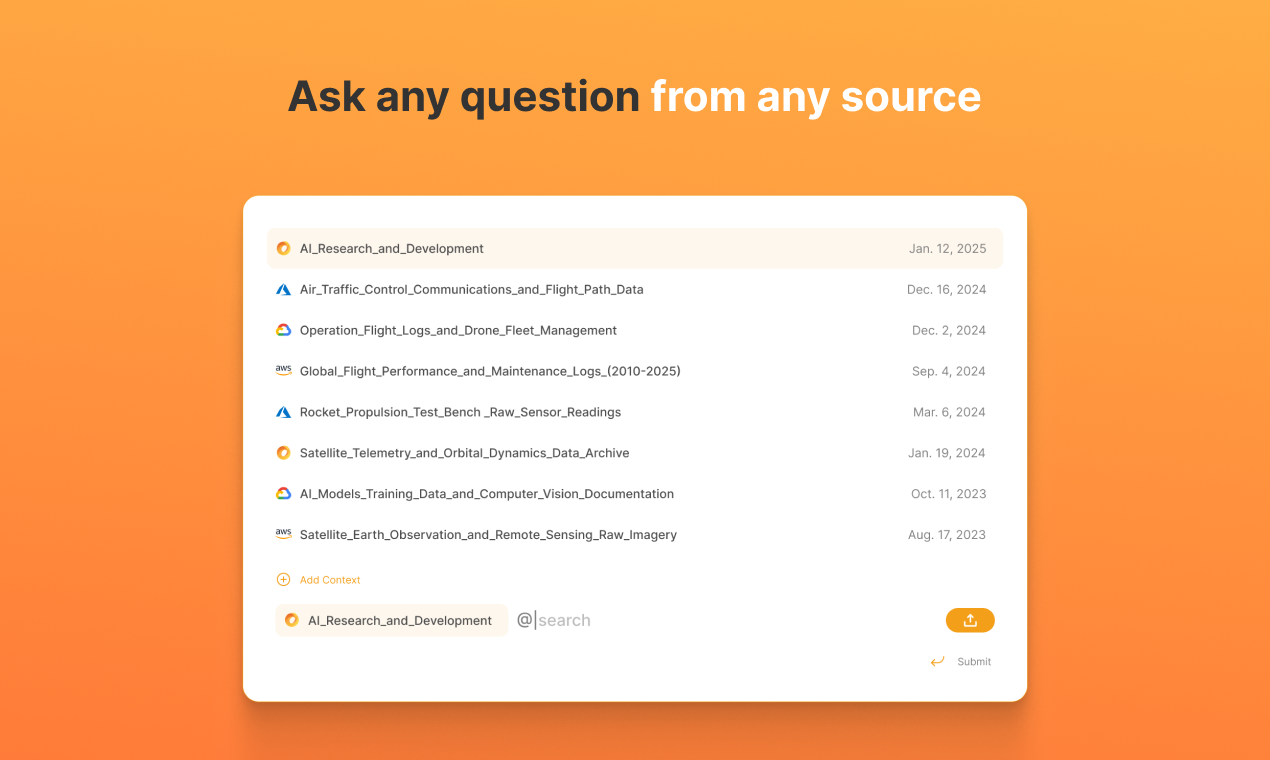
- Although Deep Research is limited to searching publicly accessible resources.Deep Lake, however, allows organizations to securely store and retrieve valuable insights from their internal research, reports, intellectual property, and confidential data.The
- This is an important step for Biotech, MedTech, Financial and Legal Industries This is critical because these industries are highly dependent on proprietary information rather than open web search results.
- Enterprise-class security features (including RBAC privilege management, SOC 2 Type II compliance certification, penetration testing, etc.) Ensure that sensitive data is always in Compliant and protected The state of the art.
2. Multimodal retrieval based on visual language modeling
Deep Lake is focused on the underlying architecture from the very beginning. Multimodal AI Retrieval features are built, which makes it easy to handle the Advantageous for complex tasks involving diverse data typesThe Although Deep Research primarily deals with Text-based queries (and has some image and file processing capabilities), Deep Lake is fully supported:
- Seamless cross-modal querying across text, images, video, audio, and structured metadataThe
- Fine-tuned Visual Language Model (VLM) optimized for multimodal retrievalTo ensure that even in the face of Highly complex mixed data queriesThe system also returns accurate and highly correlated results.
- Real-time hybrid searchIt is a clever blend of vector-based, keyword-based, and structured search techniques that significantly improves retrieval accuracy.
3. Retrieval accuracy comparable to or better than
Deep Lake is a leader in the field with its Advanced Search Architecturethat ensures that its search results are Accuracy that matches or exceeds OpenAI's Deep Research. In contrast to relying primarily on Reasoning and chain of thought processes during testing of Deep Research, Deep Lake innovatively employs the following technologies:
- Deep Memory technology, which continuously improves search accuracy by dynamically learning from a user's past search behavior, personalizes search results based on a user's specific use case, and learns industry terminology and user preferences. This ensures that Deep Lake achieves gold-standard performance in domain-specific use cases.
- Multimodal Search TechnologyThe realization of the Text, images, video, audio, and structured data across cloud and local storage Seamless cross-referencing between
4. BYOM: Bring-Your-Own-Model
Rather than being limited to a single model vendor, Deep Lake offers a choice of underlying AI models in the Full flexibilityThe
Users can Flexible access to any model of their choiceIncludes State-of-the-art open-source models, fine-tuned domain-specific Large Language Models (LLMs) and Small Language Models (SLMs), and other leading closed-source models such as Anthropic Claude and Google GeminiThe
5. Sub-second queries with cost-optimized performance
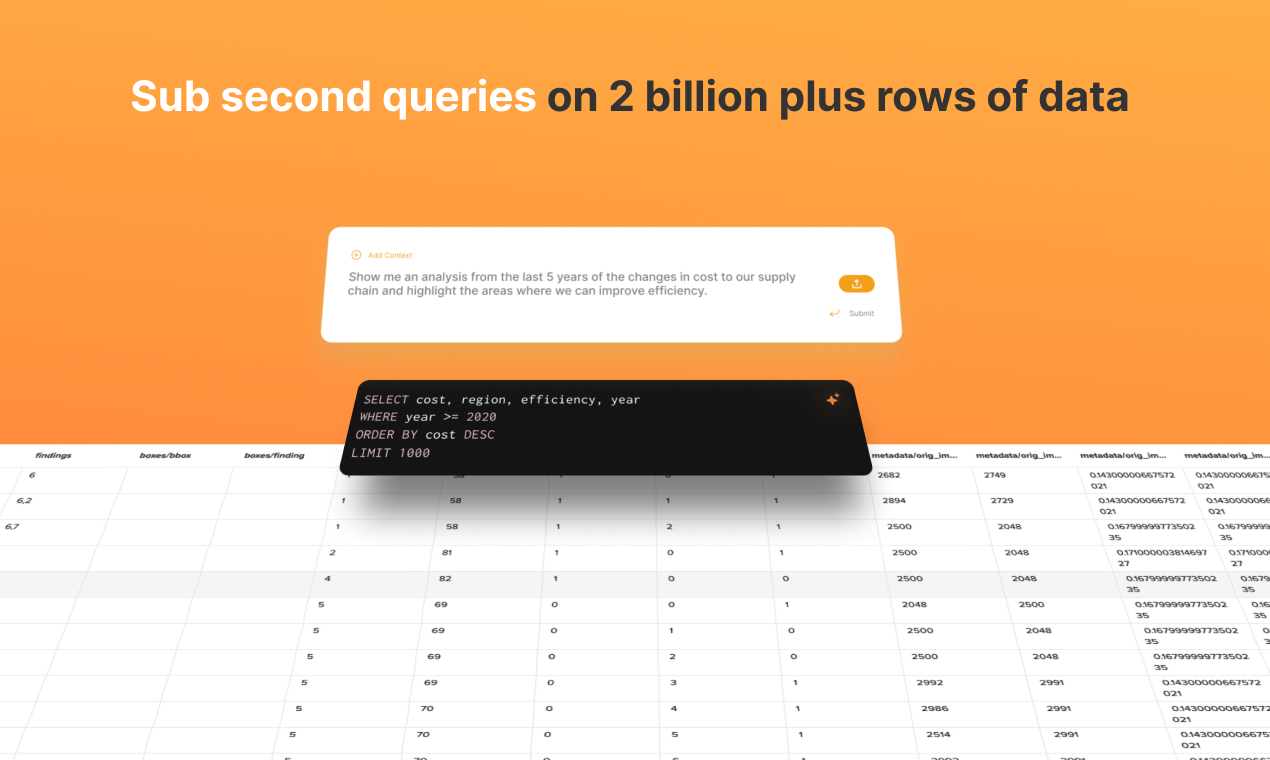
The natural language query is automatically converted into a set of sequel query statements. In terms of underlying mechanisms, Activeloop's system also выяснить ( выяснить in Russian: determine) what additional subsets of data need to be queried in order to comprehensively gather evidence to support highly accurate responses.
Deep Lake uses the index-on-the-lake technology that supports Direct from Object Storage Performs sub-second queries, compared to traditional in-memory systems, realizing the Up to 10 times more cost effective. This brings significant advantages:
- subsecond delayThe newest version of the software is the one with the fastest response time, even when working with massive data sets (more than 100 million records).
- No need for expensive caching, the query process is deeply optimized to achieve real-time retrieval while maintaining low storage costs.
- Elastic scalability across cloud environmentsThis makes Deep Lake a need to be fast,Cost-effective AI search solution for AI-native applications.
How Deep Lake Works
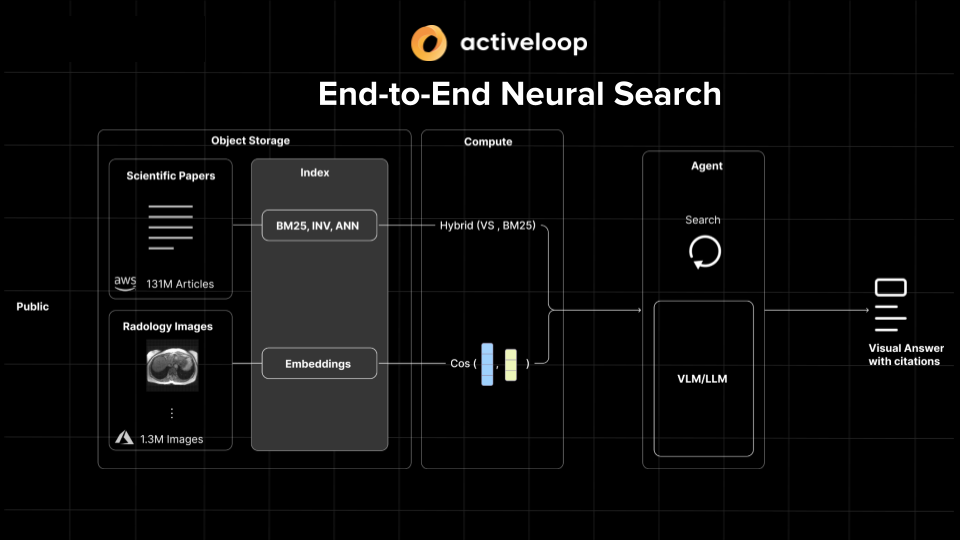
Deep Lake specializes in building key components for data storage and retrieval, with the goal of providing users with the ability to store and retrieve data in an optimal way to power AI workflows of all kinds.
After connecting and indexing massive amounts of data from users, Deep Lake's knowledge agent It can then plan a series of sophisticated research tasks and execute multi-step queries across a variety of datasets and modalities - understanding exactly what key data is needed to answer the question posed by the user (and, more importantly, determining whether the system has sufficient evidence to be able to answer that question). The knowledge agent also leverages advanced search technologies, such as MaxSim, to perform accurate searches based on the combined visual and textual context, and presents the key information retrieved as references to the user, along with citations from billions of lines of textual data.
Types of questions users can ask
Deep Lake is now open to all user team members - there are no restrictions on the number of questions users can ask, or the size and modality of the data they can query.
Listed below are some examples of the types of questions a user can ask:
Synthesis of patient history data, laboratory tests, and magnetic resonance imaging (MRI) reports
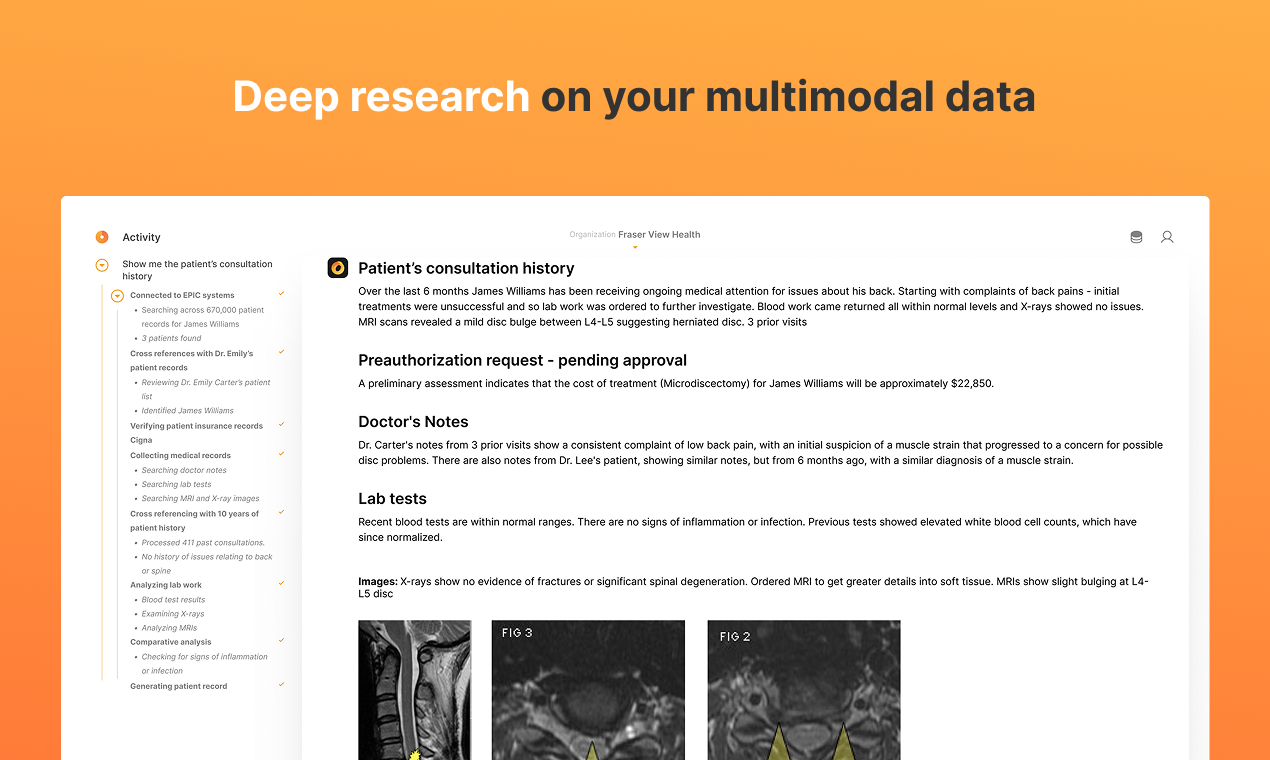
Finding references and making connections to complex terms and concepts
The following example is taken from Marcel Proust's literary masterpiece, À la recherche du temps perdu - one of the longest books ever written, with a PDF version of over 1150 pages.

In-depth querying across research findings
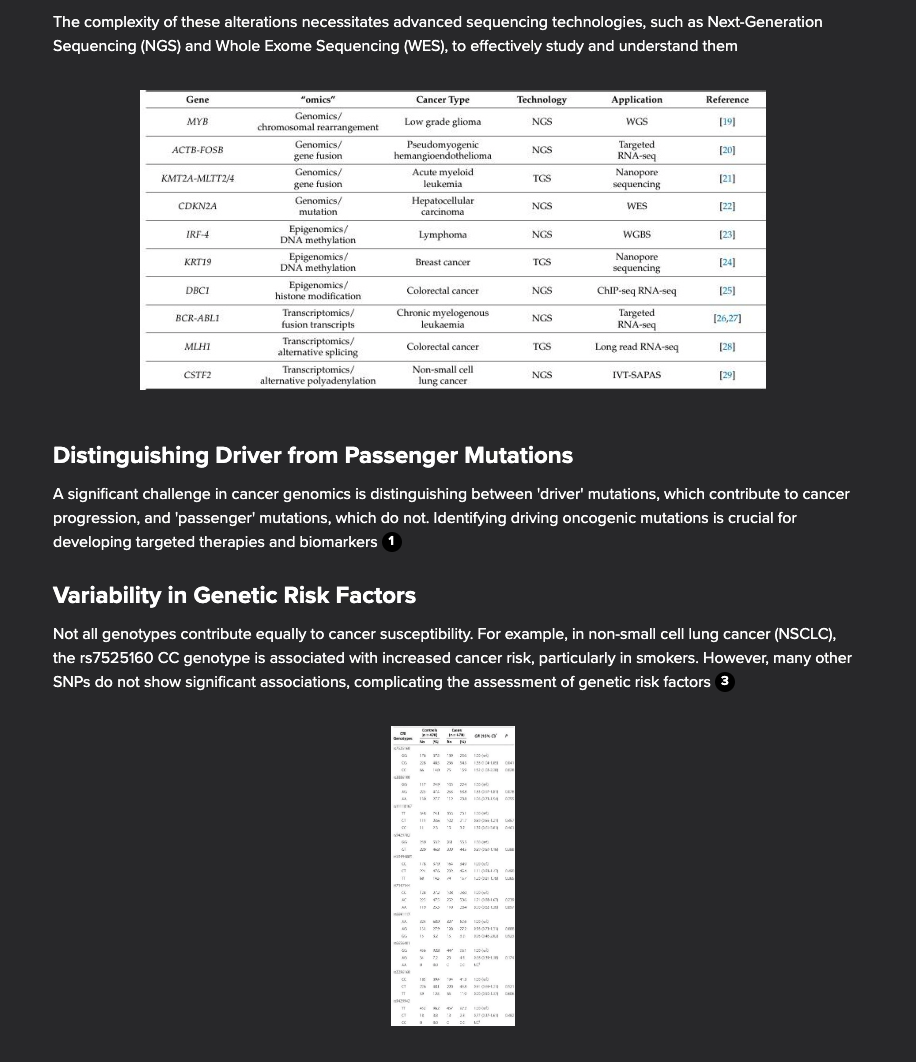
Question: What's the DeepSeek Performance across Reasoning Tasks?
The answer given by the system will contain information from both the text of the paper and the diagrams.
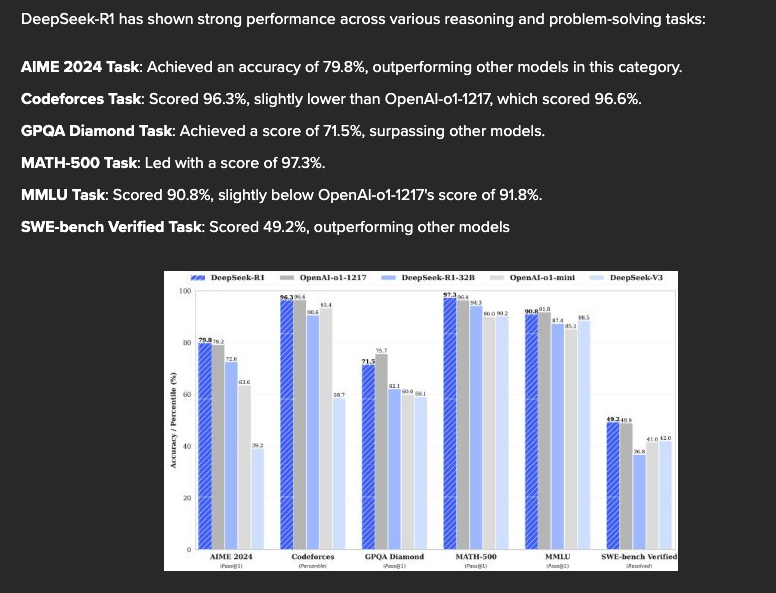
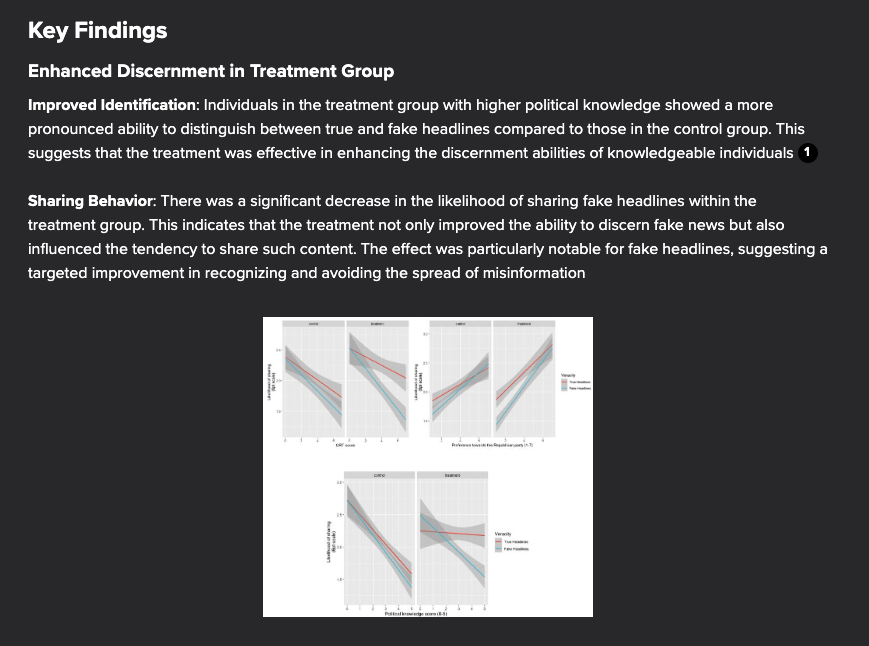
Known limitations
Inevitably, any system has limitations, and so does Deep Lake. In the case of Activeloop, the Deep Lake knowledge agent is tuned to focus more on in-depth analytics and to be cautious about response results. As a result, Deep Lake may not be the best choice when users need immediate and simple answers. However, when faced with domain-specific queries that require deeper thinking, Deep Lake demonstrates its performance.
Currently, Activeloop is officially opening the Deep Lake system for public preview in order to continuously improve the product based on valuable user feedback. In addition, Activeloop is actively developing a smart router that can switch between "fast" and "slow" thinking modes based on the complexity of the query to further optimize the user experience.
How Flagship Pioneering Leveraged Deep Lake to Achieve Breakthroughs in Biotechnology
Flagship Pioneering is a forward-thinking biotechnology company focused on the development of innovative platforms and the incubation of start-ups that are revolutionizing the field of human health and sustainability. Flagship Pioneering has entered into a deep collaboration with Activeloop to enhance its scientific research capabilities. RAG (search-enhanced generation) capabilities. In this partnership, Flagship Pioneering's Pioneering Intelligence team worked closely with Activeloop to develop an advanced system based on the Activeloop Deep Lake knowledge agent. With this system, Flagship Pioneering is able to efficiently retrieve scientific research results from all over the world and conduct in-depth mining of multimodal biomedical data, with an increase in accuracy of approximately 18% compared to traditional vector or keyword-based search techniques. In particular, the system is able to accurately capture key information from specific graphs and charts that are not explicitly mentioned in the text of the article. In particular, the system is able to capture key information from specific diagrams that are not explicitly mentioned in the text of the article, thus significantly enhancing Flagship Pioneering's research capabilities.
Fortune 500 MedTech Company Uses Deep Lake to Perform Fast, Accurate AI Searches for 40 Million+ Papers Across Data Modalities and Cloud Platforms
The power of Deep Lake has automated highly manual and repetitive search tasks in the scientific discovery and compliance workflow in MedTech. This has dramatically reduced research cycles that would otherwise take months to complete to just a few days.
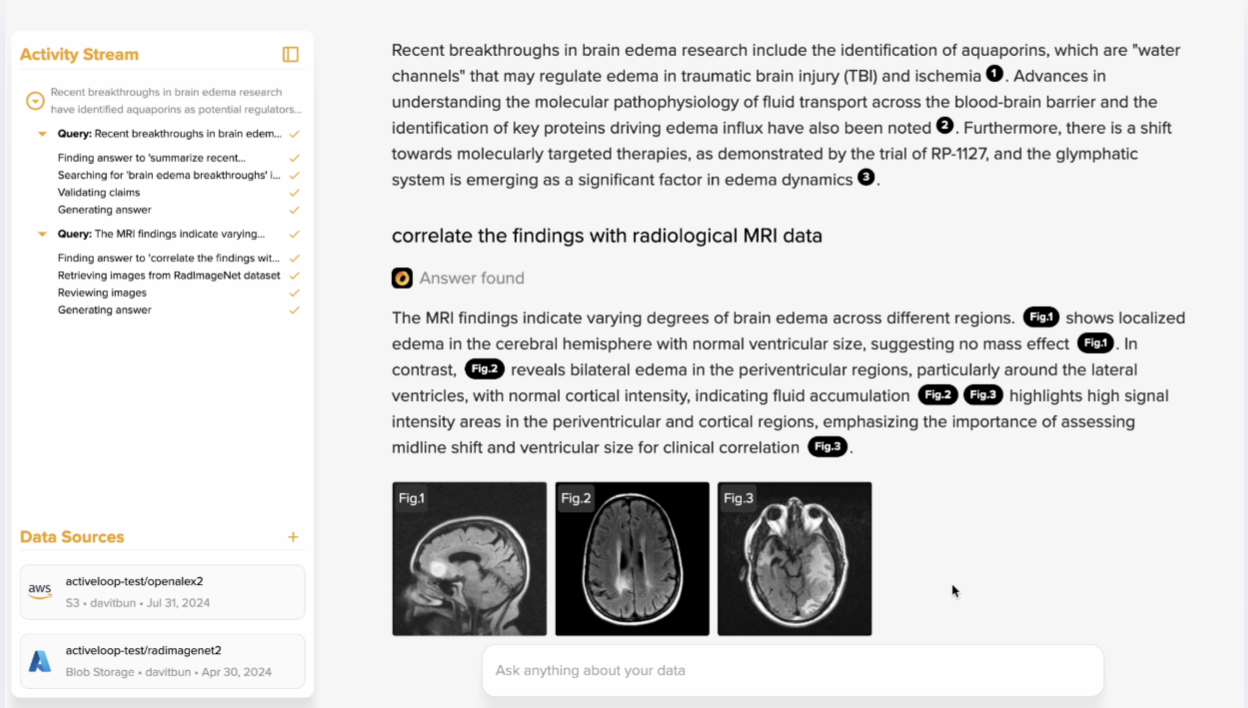
Visit chat.activeloop.ai today to begin your Deep Lake exploration. The first week is free and pricing plans start at $99 per seat (And can be flexibly expanded according to your actual data needs).
© Copyright notes
Article copyright AI Sharing Circle All, please do not reproduce without permission.
Related posts

No comments...


